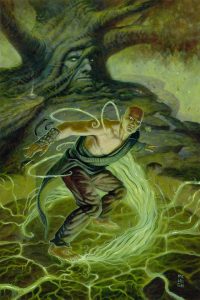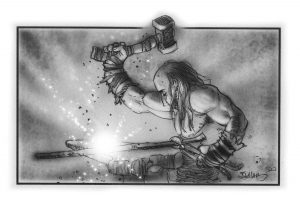 I’ve been waiting for this moment for a while now. When I took over as line developer and started thinking about what to do with the game, this book was the dream project. This was something I felt the line was seriously lacking, and I was surprised that over the previous years it never got seriously explored.
I’ve been waiting for this moment for a while now. When I took over as line developer and started thinking about what to do with the game, this book was the dream project. This was something I felt the line was seriously lacking, and I was surprised that over the previous years it never got seriously explored.
Questors and Passions.
My initial idea for the book was basically, “The Adept’s Way, but for questors.” I wanted to look a bit more closely–within the game setting–at the questor’s perspective, understand the relationship they have with their Passion, and provide inspiration for playing these sorts of characters. I also wanted to expand on the rules for questor characters.
I’ll be honest, I never found questors especially playable. While there were loads of potential from a character or story standpoint, questor mechanics were… mildly uninspiring.
That’s not meant as a knock against them. The game has always been focused on adepts. The questors mechanics were an add on to that. Which is fine. But I wanted to do something a bit more. And this book was the chance.
Quick historical overview.
The original version of the questor rules was presented in the first edition Companion, and there was little change in later revisions. All questors had a talent, Questor, that determined how powerful they were. Each questor had three powers (questors of a couple of the Mad Passions were given some additional powers in Secret Societies book), and their rank in the Questor talent determined how effective all their powers were. (So a Rank 4 questor had effective rank 4 for all their questor powers.)
Ranks in the Questor talent were bought with Legend Points like any other talent, but the rank was restricted. As a questor performed acts their patron approved of, they would earn Devotion Points, and their Devotion Point total determined the maximum rank of their Questor talent, following the same progression as Novice tier talents (so 200 Devotion to qualify for Rank 2, 300 for Rank 3, etc.).
If a questor failed to act in an appropriate manner, they could lose Devotion Points, which, if their total dropped below a threshold, could lead to losing ranks in the Questor talent.
In my opinion, this system was kind of fiddly, as it required tracking an additional resource that didn’t have much of an effect on the game outside of determining the maximum power a questor could have. It did tie the character’s power level to role-playing, though. If the character doesn’t behave in alignment with their patron’s ideals, they don’t advance. Still… the punitive aspect of, “if you don’t do this thing you lose power” was a bit wonky, and ripe for potential GM-on-player abuse.
With that ground work laid out, my biggest issues with the system were the dearth of powers, the way multiple powers (as few as there were) were tied to a single talent rank, and fiddly Devotion Point tracking that didn’t offer much except a way to limit power and mechanically strong-arm role-play.
The new system for questors tries to address these issues. It provides more powers, and more variety among questors. Devotion has been completely reworked to have a greater impact on game play and give something to questors that adepts don’t have. Questors still aren’t as powerful as adepts–at least when you look at the number of magical tricks and abilities they have available–but I think the new system makes them a bit more viable as characters in Earthdawn (whether players or gamemasters).
It also turns out the new system provides a really nice framework for other stuff, which I’ll get to another time. We’ll talk about Devotion in a bit more detail in a future post as well. For now, I just want to provide a broad overview of how the system works.
Instead of talents, questors gain Devotions. Mechanically, they work like talents or skills. They have a rank, which is usually added to an Attribute to determine the final Step when making tests. The difference in terminology is to provide a clear division: while they may work the same way (and may even share the same name in some cases), devotions are not talents, so abilities or powers that affect talents usually don’t affect devotions (and vice versa).
 The lynchpin of a questor character is their Questor devotion. It behaves like the Versatility talent available to human adepts. For each rank in their Questor devotion, the character may choose a power from a list specific to their patron. Some of these are identical to existing talents or skills, while others are powers unique to questors (and often unique to a specific Passion).
The lynchpin of a questor character is their Questor devotion. It behaves like the Versatility talent available to human adepts. For each rank in their Questor devotion, the character may choose a power from a list specific to their patron. Some of these are identical to existing talents or skills, while others are powers unique to questors (and often unique to a specific Passion).
(The Questor devotion ties into a couple other things as well, but I’ll explain those another time.)
For example, here’s the list for Astendar:
- Follower Devotions: Acting, Artist, Conversation, Emotion Song, Empathic Sense, Entertainer, First Impression, Impressive Display, Passion’s Empowerment, Winning Smile
- Adherent Devotions: Assess Intentions, Astendar’s Muse, Astendar’s Voice, Diplomacy, Enchanted Gift, Lasting Impression, Passion’s Insight, Passion’s Inspiration
- Exemplar Devotions: Bardic Voice, Disarming Smile, Fertility’s Season, Live in Bloom, Silence Influence, Thought Link
The different groups are equivalent to adept tiers (Novice, Journeyman, etc.), and a questor can choose a power from their current tier or lower. So a questor with Rank 1 through 4 in their Questor devotion can learn powers from the Follower tier. From Rank 5 through 8 they can choose powers from the Adherent or Follower groups, and an Exemplar is Rank 9 through 12 and can choose from any of the groups.
The lists of devotions (called “granted devotions”) are not exhaustive, the ones presented in the upcoming book are just the most common.
Each devotion is bought and increased separately, and its rank is limited to the same rank as the Questor devotion (similar to Versatility). Ranks are purchased with Legend Points, and–similar to talents–don’t require much time to raise.
There are a couple of effects of this new setup for a questor’s core abilities. First, it’s quite a bit more Legend Point intensive than the old version. This is intentional; while some adepts become questors, the increased cost provides a mechanical reflection of the difficulty of walking both the questor’s path and the adept’s way.
The other effect is to provide a broader variety of powers and power distribution to questors, allowing a degree of customization that wasn’t present before, but still not overshadowing adepts. Much like the way adepts can be built with different flavors (depending on their choice of talent options), questors can choose devotions fitting a particular ideal or theme.
There’s more to it than this, of course, and over the next few weeks I’ll look at other pieces of the system and preview some of the unique powers available to questors. I hope you like this initial look, and are excited for the possibilities it offers.
Join us next week when we take a look at the brand-new Devotion mechanic. See you in seven!

One thought on “Passions! And Questors!”
Comments are closed.